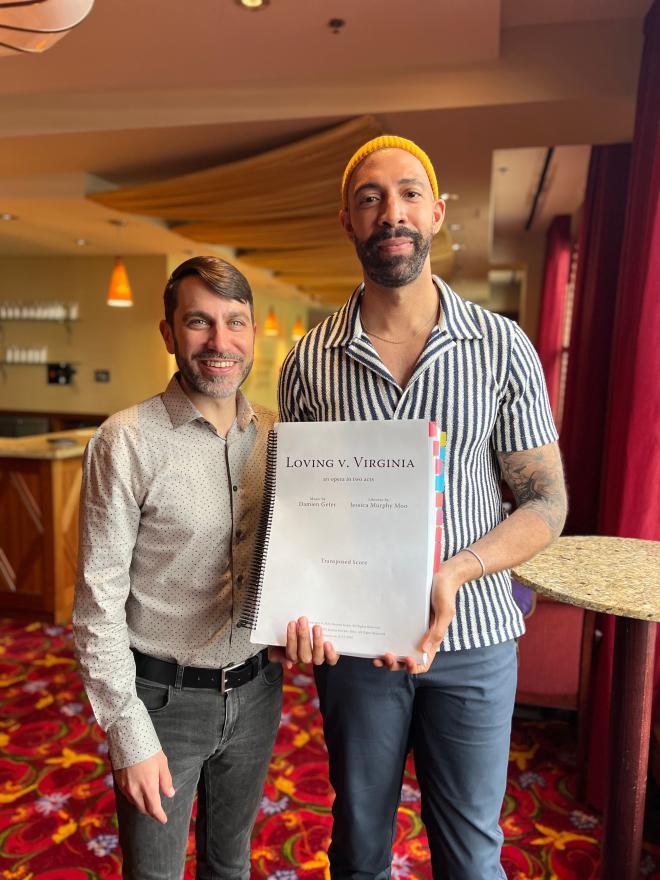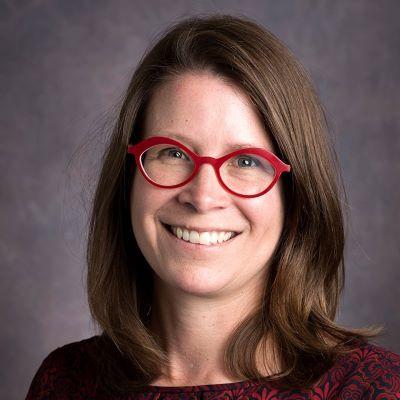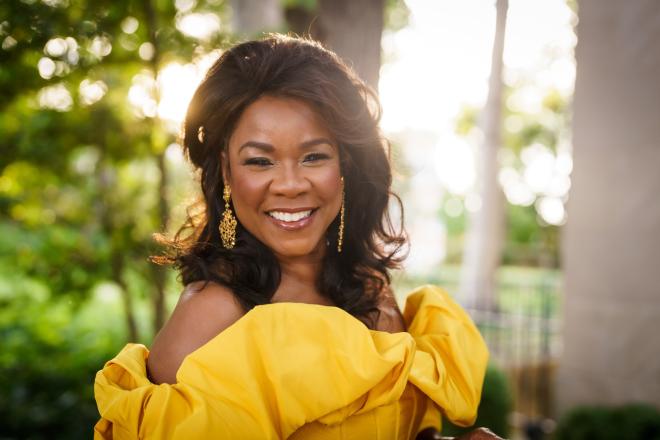Virginia Opera celebrates its fiftieth anniversary this season, and a highlight of this year’s offerings is a work commissioned by Virginia Opera and the Richmond Symphony: Loving v. Virginia is a new opera with a libretto by Jessica Murphy Moo and music by Damien Geter, drawing on the lives of Mildred and Richard Loving and the landmark 1967 Supreme Court ruling that held laws against interracial marriage to be unconstitutional. I reached out to the composer and librettist, as well to as the production’s director, Washington, DC native and international operatic superstar Denyce Graves, as we look forward to the world premiere with performances in Fairfax on May 3 and 4 at the Center for the Arts at George Mason University.
Evan Keely: Damien Geter, I’m glad to once again have this opportunity to more deeply explore your extraordinary music-making, now that I’ve experienced your song cycle COTTON and your performance as William Still in Virginia Opera’s production of Sanctuary Road by Paul Moravec and Mark Campbell. Your new opera Loving v. Virginia is something I and many of us have been anticipating with great excitement. Virginia Opera’s Artistic Director Adam Turner, who will conduct the performances, has talked about you as “the right composer” for this commission. As you’ve remarked, you are a native Virginian, so the story of Mildred and Richard Loving and their legal and personal victory has a special resonance for you as not only an American story, but a Virginian story. And your first encounter with the art of opera was at a Virginia Opera staging of Strauss’ Elektra many years ago. Many strands of your creative and personal life seem to be coming together in this project.
Tell us about the music in this opera. How is it similar to or different from some of your other works, such as COTTON or An African-American Requiem? Where does it fit in your ongoing evolution as an opera composer, with American Apollo, Delta King’s Blues or Jubilee?
Damien Geter: The music in Loving v. Virginia is quite eclectic as the drama and emotions of the story vary from scene to scene. The palette ranges from very lyrical, sweeping lines to pointed, sharp harmonies and moments of undefined tonality. While the story takes place in the ’50s and ’60s, there are only a few moments that are derived from those eras.
EK: Is this your first collaboration with librettist Jessica Murphy Moo? What’s it been like? Weren’t you two acquainted before this project?
Damien Geter: Yes, this is my first time working with Jessica. I met her in 2017 when I was in Seattle Opera’s production of Porgy and Bess. Her daughter was in the show, and Jessica and I befriended each other. She is the most perfect collaborator, and a supportive colleague. I look forward to writing more opera with her someday! *Fingers crossed*
EK: In a 2023 interview with Patrick D. McCoy, you remarked that “we’re living in very dangerous times,” but personal experience can bolster social progress. This opera surely is a cultural statement that’s all too relevant in 2025. Are you still hopeful about the freedoms that have been won? What does this opera do to strengthen that freedom for all of us?
Damien Geter: Honestly, this is just an opera. It might instill a drive in folks to fight as it surely highlights a time in history that feels dangerously close to being repeated, but real change happens when people vote in every single election — locally, statewide, and nationally.
EK: Jessica Murphy Moo, in addition to being the editor of Portland Magazine and teaching writing at a number of prestigious institutions, you are no stranger to opera or to the libretto as an art form. As well as having served in important roles with several American opera companies, you were the librettist for Earth to Kenzie, an opera with music by Frances Pollock that was commissioned by Seattle Opera and Lyric Opera of Chicago; you collaborated with composer Jack Perla to create An American Dream. It seems like there may be a common theme in these three libretti: the harm done through exclusion and inequity, and the healing and progress that can come with inclusion, equity, compassion and imagination. How was writing Loving v. Virginia like these other projects? What was different about it?
Jessica Murphy Moo: You’re right! All three operas do involve a large-scale societal injustice pressing down on the individual — the parent, the child, the couple — and how those individuals respond with their full humanity. Loving v. Virginia is exactly that kind of story. Mildred and Richard Loving were an interracial couple who wanted to get married and raise their family in their home state of Virginia. They were blocked from doing so by legalized racism, Virginia’s Racial Integrity Act. After they were arrested, tried, and convicted, they were banished from their home state for 25 years. They responded to this injustice with courage and dignity, and their response changed American history and the lives of so many people even 60 years after the fact.
What is different is that Loving v. Virginia really happened. Their case is in the public record. We wanted to try our best to get the public record correct, and we also wanted to find opportunities for opera to do what it does best — to get the music into those small, intimate, behind-closed-doors moments where decisions are made, where risks are taken, where dreams and doubts are shared or hidden. Mildred and Richard Loving were real people, so we wanted to honor who they were as best we could. There are many ways to learn about Mildred and Richard Loving and their landmark civil rights case. Our hope is that the opera version of the story gets the audience to feel this American history — and what was at stake — in a new way.
EK: You did a lot of historical and legal research to understand this important event in our nation’s history. But this is also a story of a marriage and of a family; the very personal blends with the national and perhaps even the global. How did you reconcile these elements as a librettist? And what were your creative processes as you sought to educate the audience about an impactful Supreme Court case, while also telling a human story with universal themes like despair, struggle, hope and love?
Jessica Murphy Moo: Damien and I were in constant conversation about this tension between the large forces of the law and the individual, and also the tension between the noise (the publicity/press) surrounding Mildred and Richard Loving and the quiet, private life they wanted in Central Point, Virginia. Damien’s music helps you feel that tension with real immediacy. The music for the Law Chorus, for instance, sounds very different from the music of Mildred and Richard’s love and desire for home. The language is different, too. The Law Chorus takes snippets of actual legal language from the warrant for their arrest, the Racial Integrity Act, their court summons, legal briefs, oral arguments. In contrast, Mildred and Richard’s language is familial and vernacular; it grows out of the context of their home.
EK: How do you know Damien Geter? What was this collaboration like for you?
Jessica Murphy Moo: I met Damien when I was working at Seattle Opera and he was performing in Porgy and Bess. My oldest daughter was a supernumerary in the opera. Damien and I connected later during a workshop of Earth to Kenzie and realized we both were living in Portland, OR, and I learned that he was also a composer. So, we started meeting for coffee and throwing ideas around. Then in 2021 he called to ask if I wanted to work on this project with Virginia Opera and the Richmond Symphony, and it felt a dream come true. Damien is a collaborator in the very best sense of that word. There is total trust and respect there. I swear any idea I threw his way… he just picked it up and ran with it. Working with him has been all joy.
EK: You’ve shared that this landmark civil rights case has great significance for you personally, and for your family. How did that inform your libretto writing process for this opera?
Jessica Murphy Moo: I am in an interracial marriage. My husband and I have three beautiful children. I have always felt immense gratitude to Mildred and Richard Loving. They stood up for the right for my family to exist. Out of all of this gratitude came a feeling of great responsibility to them, to this project. I hope the story we are telling honors them. Mildred’s decision to write a letter to Bobby Kennedy and then to the ACLU — that important powerful decision to use her voice — is something I thought about a lot as I was working on this piece. Opera excels in powerful voices! And Mildred’s decision to use her voice has made life better for so many people. There was so much distilled power in that choice. I also thought a lot about motherhood during the writing of this piece. Mildred was pregnant when she was arrested, and they had a young son at home. When she and Richard went to court, she had a very young baby at home. The stress of that is just crushing. There is a lullaby moment, where Mildred is singing to her newborn, and I did think of that as a love letter of sorts to my own children, about how every mother wants their child to know a full sense of love and belonging.
EK: Are there opera projects in your future that you want us to know about?
Jessica Murphy Moo: Damien and I have been throwing around a bunch of ideas. We just want to be ready in the event that stars align for us to work together again. Cross your fingers for us!
EK: Denyce Graves, permit me to say how gratifying it is to see how you’ve continued to add directing to your phenomenal contributions to the lyric stage. It seems a lot has happened in your career and in the world since your directorial debut in 2022 with Carmen at the Glimmerglass Festival with Minnesota Opera. Is Loving v. Virginia your first world premiere as director?
Denyce Graves: Yes, this is my first world premiere.
EK: One of the many things I appreciate about you is the way you lend your talents to new works and emerging artists. This isn’t your first collaboration with Damien Geter — I so appreciated the immersive experience that was COTTON two years ago at the Kennedy Center. You’ve also championed The Passion of Mary Cardwell Dawson, a play by Sandra Seaton with original music by Kennedy Center Composer-in-Residence Carlos Simon. And, of course, the important work of the Denyce Graves Foundation is a powerful manifestation of those values and goals. How does directing Loving v. Virginia align with your personal mission?
Denyce Graves: Loving v. Virginia is set in 1967, but actually it’s a mirror held up to 2025. As an artist and director, I see my work not just as storytelling, but also truth-telling — especially when the truths we’re wrestling with are about love, dignity, and belonging. What’s most moving about this opera is that it doesn’t live in the past. It’s relevant now.
EK: This new opera addresses an event of immense consequence not only for American law, but for our culture, our shared understanding of freedom, and the way we think about intimacy and family life in our country. Even in just the few years between the time the opera was commissioned and this premiere, it seems like a great deal is happening in the United States to remind us that the questions of personal and communal liberty, inclusion and justice remain far from resolved. The opera points to an event in 1967, but surely it’s also powerfully relevant for life in 2025? How do you navigate that as an artist and as a director?
Denyce Graves: The questions that Mildred and Richard Loving faced about who gets to love whom, where we get to call home, what protection the law offers, and to whom — are not echoes of another time. They are questions we are STILL asking in 2025.
As a director, I’ve staged the story simply and intimately, so that the audience is focused on the humanity at the center of it. The singing actors that I’m working with here are also on the same page and approach this with purity and authenticity. Our set design is minimal, and I focus on creative blocking, lighting, and spatial relationship to carry the emotional arc.
The opera ends quietly (no one dies), but not passively. It invites us to imagine what a just and loving society could be like. It reminds us that the law can change in an instant, but hearts and systems take time — and art can help move both.
WETA Passport
Stream tens of thousands of hours of your PBS and local favorites with WETA Passport whenever and wherever you want. Catch up on a single episode or binge-watch full seasons before they air on TV.


